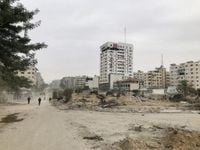Just days after several sick and injured children from Gaza arrived in the United States for urgent medical treatment, the U.S. State Department abruptly halted a program that had allowed visitor visas for people from Gaza. The decision, announced on August 20, 2025, has sent ripples through humanitarian organizations and advocacy groups working to provide care to some of the most vulnerable civilians in the conflict-ravaged territory.
The now-paused program had enabled a small number of children, accompanied by adults, to travel to American cities such as Seattle and Houston for critical medical procedures unavailable in Gaza. According to Scripps News, the nonprofit Heal Palestine was instrumental in facilitating these recent transfers, bringing hope to families desperate for help. However, the program's sudden suspension has left advocates and families reeling, unsure of what the future holds for those still in need.
Secretary of State Marco Rubio, speaking on CBS' Face the Nation, explained the rationale behind the decision. He said multiple congressional offices had reached out to the State Department, seeking clarification on how these medical-humanitarian visas were granted. According to Rubio, some congressional offices also provided evidence—though unspecified—that they claim links certain organizations involved in the visa process to Hamas, the group that governs Gaza and is designated a terrorist organization by the U.S.
Rubio stated, "We are not going to be in partnership with groups that are friendly with Hamas. So, we're going to pause those visas, there was just a small numbers of them issued to children, but they come with adults accompanying them, obviously – and we are going to pause this program and re-evaluate how those visas are being vetted and what relationship there has been, if any, by these organizations to the process of acquiring those visas." He did not elaborate on the nature of the evidence or name the organizations allegedly involved.
The move comes amid heightened scrutiny from some conservative commentators. Laura Loomer, a right-wing media personality, labeled the children and their guardians as "refugees" and suggested they posed a national security threat. This characterization, however, was firmly rejected by those directly involved in the medical missions.
Heal Palestine, the nonprofit that arranged for the children’s travel, issued a statement expressing deep disappointment: "This is a medical treatment program, not a refugee resettlement program. Our mission gives children a renewed chance at life." The group emphasized that its efforts are strictly humanitarian, focused on providing life-saving care to children who cannot access it in Gaza.
For organizations working on the ground, the State Department’s decision is more than a bureaucratic hurdle—it’s a matter of life and death. Sean Carroll, president of Anera, a nonprofit dedicated to humanitarian relief in Gaza, warned of the dire consequences. "People will lose their lives over that decision and others may not lose their lives, but they'll lose hope of getting better treatment, of getting better faster, of getting better care," Carroll told Scripps News.
He continued, "And I don't think that if we are to be humane and be humans, we should recognize that innocent civilians, children who are, who are severely injured or who are, who need medical care because of a combination of factors of not enough food, of bad hygiene conditions, because of the destruction of water and sanitation systems - they should be helped. And, and I think the U.S. should be at the top of the list of countries that's helping people, innocent civilians, Palestinians from Gaza who need medical care."
The humanitarian need in Gaza is staggering. The World Health Organization estimates that more than 14,000 people in Gaza currently require life-saving medical care. The ongoing war has devastated the region’s health infrastructure, with hospitals overwhelmed, supplies scarce, and many facilities damaged or destroyed. Before the conflict escalated, between 50 to 100 people from Gaza would travel daily to seek medical care unavailable at home, often in neighboring countries. Now, with borders largely sealed, only a handful manage to leave for treatment.
The State Department has not specified how long the halt on visitor visas for Gazans will remain in effect. The lack of clarity has left humanitarian groups scrambling to adjust plans and, more importantly, left patients and families in limbo. For those already in the U.S., the focus remains on securing the best possible outcomes for the children’s health. But for thousands still in Gaza, the path to life-saving care has become even more uncertain.
The controversy has highlighted the difficult intersection of humanitarian need, security concerns, and political scrutiny. Congressional offices, particularly those with a more hawkish stance on Middle East security, have pressed for greater oversight of any programs that could be exploited by groups with ties to Hamas. Yet, as advocates point out, the overwhelming majority of those seeking medical visas are children and civilians caught in the crossfire of a conflict they did not choose.
The debate has also underscored the broader challenges facing Gaza’s health system. Years of blockade, repeated military operations, and internal political strife have left medical facilities in a state of collapse. Basic supplies are in short supply, and specialized care—such as cancer treatment, complex surgeries, or advanced diagnostics—is often impossible without leaving the territory. The war has only made things worse, with infrastructure damage compounding an already dire situation.
Humanitarian organizations have long argued that medical neutrality—the principle that all wounded or sick people should receive care regardless of their identity or the political context—must be upheld, even in the most fraught circumstances. The current pause on visas, they say, risks abandoning some of the most vulnerable, including children who have already suffered unimaginable trauma.
For now, the eyes of the international humanitarian community are on Washington, awaiting further guidance from the State Department and hoping for a resolution that balances legitimate security concerns with the urgent imperative to save lives. As the situation evolves, the stories of the children who made it to the U.S.—and those still waiting for a chance—serve as a stark reminder of the human cost of conflict and the complex moral choices facing policymakers.
With the future of the medical visa program uncertain, advocates remain steadfast in their call for compassion and action. The fate of thousands in Gaza may well depend on decisions made far from the war zone, in the corridors of power in Washington, D.C.


